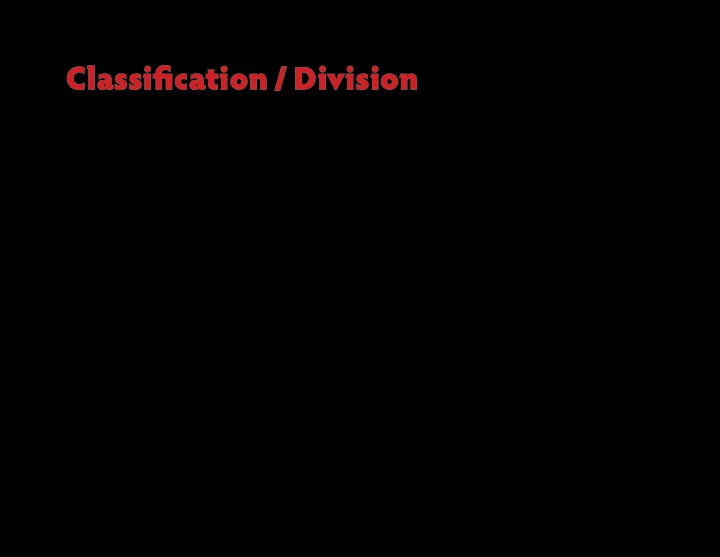

Classifjcation / Division 07.08.10 || English 1301: Composition & Rhetoric I || D. Glen Smith, instructor
Classifjcation/Division Essay Pattern In Simplest terms: Division breaks a whole topic into smaller, manageable units. • Each unit in turn is then examined. • This results in the author analyzing the connections between the various parts. • Then the author analyzes connections of the various parts with the whole topic. Example: For a fund raising medical brochure, the concept of a hospital can be broken into smaller components for easier explanations of how money is to be directed towards different departments: pediatric, cardiac, maternity—each one of these in turn has their own facilities and patients. The writer would show how funds given to these departments would benefit the hospital as a whole unit. 2 07.08.10 || English 1301: Composition & Rhetoric I || D. Glen Smith, instructor
Classifjcation/Division Essay Pattern Another example: When describing a character’s motivations in a novel, you would divide the book into sections and show how the plot develops around the central character within each section. • chapters 1-5, young boy • chapters 6-10, young man • chapters 11-15, adult 3 07.08.10 || English 1301: Composition & Rhetoric I || D. Glen Smith, instructor
Classifjcation/Division Essay Pattern Classification arranges and groups items into ranked lists or categories. • The writer establishes common characteristics, such as theme or intentions. • The goal is to understand the full topic by understanding the sum of its parts: students in high school: freshman, sophomore, junior, senior recent movie releases: chick flick, action, horror, family, science fiction, musicals, adult, animation • The individual groupings are called a class. By placing elements in a particular class, the concept as a whole is less confusing for the writer to manage. 4 07.08.10 || English 1301: Composition & Rhetoric I || D. Glen Smith, instructor
Classifjcation/Division Essay Pattern • If necessary, a class can be further divided into elements of subclass For example: The film category of animation can be broken down further into: flip book, cut paper, graphic, classic animation, digital 3-d computer, clay. • This strategy can prove useful when you need to narrow your subject. If you break your topic into units and sub-classes, one of the smaller chunks of information could be the main focus of your thesis. • Another useful point: you can structure your paper around the various subclasses if they are a manageable quantity. The classes or subclasses would in turn then be the organization for the full body of the essay. 5 07.08.10 || English 1301: Composition & Rhetoric I || D. Glen Smith, instructor
Classifjcation/Division Essay Pattern Develop a strong thesis: For classification writing, a thesis should include the established divisions which will then become the topics of each paragraph, or series of paragraphs. Example: The film category animation can be broken into groups: primitive flip book, classic cels, trendy clay animation, and the computer influenced 3D digital. This then prepares the reader for the possible divisions within the paper. The various points of reference throughout will correspond to the categories: early cut paper films, Looney Tunes painted cels, and the recent explosion of 3D digital work. A clear plan of development is shown to the reader. 6 07.08.10 || English 1301: Composition & Rhetoric I || D. Glen Smith, instructor
Classifjcation/Division Essay Pattern Of course you can use both classification and division techniques in one paper: • You can use classification to describe the hierarchy in a typical high school clique, by identifying the various roles within a small group of teenagers, and classifying their different purpose to their group. • During the next step, division, you would then analyze each of the individual roles, explain their function in the whole group and even in the whole school, and also with each other individually. Ultimately you would be able to support or re- fute the view that high school is a period of conformity . 7 07.08.10 || English 1301: Composition & Rhetoric I || D. Glen Smith, instructor
Classifjcation/Division Essay Pattern 1 4 2 3 8 07.08.10 || English 1301: Composition & Rhetoric I || D. Glen Smith, instructor
Classifjcation/Division Essay Pattern 1 4 2 3 9 07.08.10 || English 1301: Composition & Rhetoric I || D. Glen Smith, instructor
Classifjcation/Division Essay Pattern 1 4 2 3 10 07.08.10 || English 1301: Composition & Rhetoric I || D. Glen Smith, instructor
Classifjcation/Division Essay Pattern When using a division/classification essay: • Do not let a subject overlap into two categories. Be sure the titles of the divisions are related and follow the same principle. For example: • If discussing animals at the zoo, it is incorrect to divide them into sections such as: mammals, reptiles, birds, and endangered species. You’ve allowed a discrepancy to appear in your logic. A rare amazonian parrot would fit into both birds and endangered species . 11 07.08.10 || English 1301: Composition & Rhetoric I || D. Glen Smith, instructor
Classifjcation/Division Essay Pattern • Or let’s say you are dividing your Fall Term classes into categories; you could divide the classes into categories titled thought-provoking and entertaining . However, since some classes can be both thought-provoking and entertaining at the same time, the two categories overlap—and therefore it is a bad classification. thought provoking entertaining 12 07.08.10 || English 1301: Composition & Rhetoric I || D. Glen Smith, instructor
Classifjcation/Division Essay Pattern The types of groups must be consistent. In addition, all individual class subjects must factor into the analysis—you cannot select random elements. Classifications have to include all the possible types to completely cover the topic appropriately and fairly. thought provoking average dull 13 07.08.10 || English 1301: Composition & Rhetoric I || D. Glen Smith, instructor
Recommend
More recommend